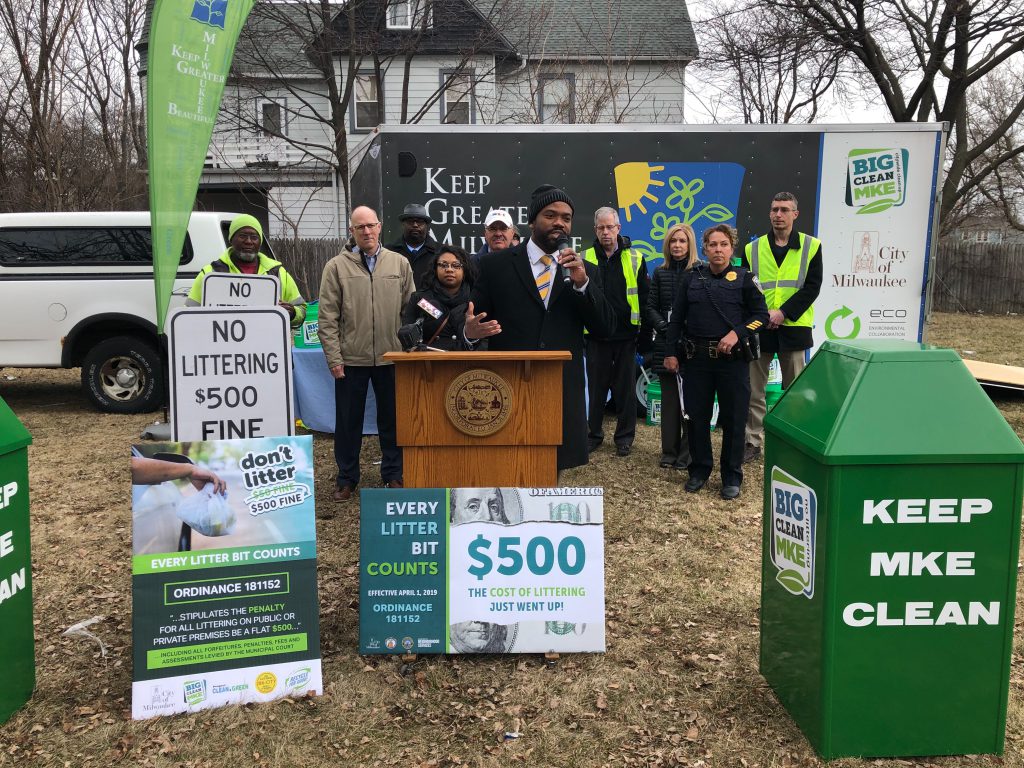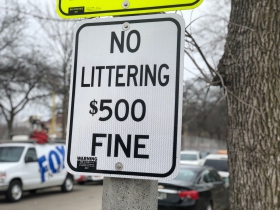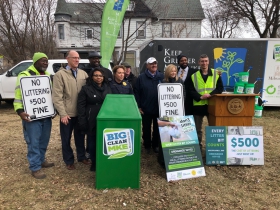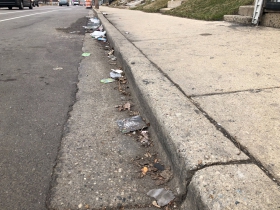Making America’s Cleanest City?
City initiating campaign and steep fines for littering to help clean up Milwaukee.

Alderman Russell W. Stamper, II speaking at a press conference announcing the city’s clean up campaign. Photo by Jeramey Jannene.
Alderman Russell W. Stamper, II has a bold vision. He wants Milwaukee to become the cleanest city in the country.
“I realize this won’t happen overnight, but if we work together we will be successful,” said Stamper at a Monday morning press conference announcing the city’s Big Clean MKE campaign.
After ticking off all of the city departments involved, ranging from the Department of Public Works to the Milwaukee Police Department, Stamper noted the city can’t get it done by itself. “We cannot do this without the other part of the team and that’s the entire community,” said the alderman.
“Little by little, I think we have got away from being mindful of what our city looks like,” said Stamper’s colleague Alderwoman Chantia Lewis. “Don’t be a litterbug. Keep Milwaukee clean. We all need to do our part.”
Municipal Judge Derek Mosley said the municipal court will do what it can to support the effort. “We are hoping the $500 fine is a deterrent,” said Mosley. Those convicted of littering will have the option of community service. Mosley said the court could issue up to 50 hours of community service per offense with the Department of Public Works.
But today the municipal court doesn’t see many people in his court for littering offenses. The police department told Urban Milwaukee it only issued 51 citations for littering in 2018.
The rate of less than one ticketed offense per week is too high for Stamper. “I hope it goes down,” said the alderman. “If it goes up something is not working.” His vision relies on creating a city that cleans up after itself. But judging by the area around the site of the press conference, a vacant lot at N. 9th St. and W. North Ave., the city is currently missing out on ticketing countless offenders.
Join the Clean Up Effort
The city and non-profit partner Keep Greater Milwaukee Beautiful (KGMB) have a number of events planned for the community to get involved.
KGMB will host a community-wide cleanup kickoff on April 27th from 9 a.m. until 12 p.m. at Lincoln Park. The city is also planning to host the second annual citywide Big Clean MKE day on August 17th.
Can’t make any of the events? KGMB will distribute “whatever it takes” to clean up your neighborhood said the group’s executive director Joe Wilson. That includes everything from garbage bags and gloves to a “mobile tool shed” for groups of 30 or more. Those interested can register on KGMB.org.
From May 6th through June 24th, the city will also be offering expanded garbage pickup through Project Clean and Green. Bulk item pickup will be provided at no cost on predetermined dates. To learn more visit the city’s website.
Photos
If you think stories like this are important, become a member of Urban Milwaukee and help support real independent journalism. Plus you get some cool added benefits, all detailed here.



























Container deposit legislation would help even more. Right next door, in Michigan, a 10¢ surcharge is added to cans and bottles. The manufacturer (e.g. MillerCoors, CocaCola) is required to pay into a fund that reimburses this 10¢ to anyone returning a can or bottle to a designated collection point. You don’t find too many dimes littering the streets, do you? By effectively turning every can/bottle into a dime, people are given a financial incentive to clean up, rather than just being asked politely to do the right thing. What we have instead is a system with privatized profits and socialized costs of cleanup of the externalities (trash, in this case). Taxpayers, through their local government, are paying for collection and recycling/disposal of waste being produced by private companies. These $500 fines are sticks, and arguably regressive ones; we should be focusing on carrots.